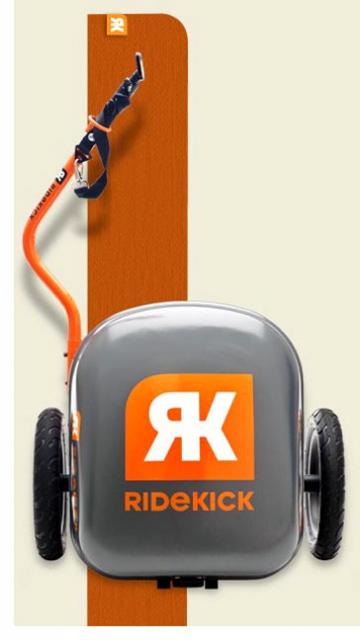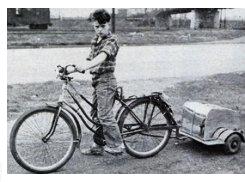 The drawback with electric bicycles is that they can be a little heavy to pedal long distances without the help of the motor and too expensive to buy in addition to a good conventional bicycle. Enter the Ridekick, a small electric trailer that hitches to almost any type of bicycle to push it at speeds of up to 19mph and costs £450.
The drawback with electric bicycles is that they can be a little heavy to pedal long distances without the help of the motor and too expensive to buy in addition to a good conventional bicycle. Enter the Ridekick, a small electric trailer that hitches to almost any type of bicycle to push it at speeds of up to 19mph and costs £450.
A throttle mounted on the bicycle’s handlebars controls the speed and the trailer can be uncoupled in 15 seconds. The trailer can push a bicycle for between 8 and 12 miles before it needs to be recharged.
Every electric bike configuration adds weight, but the makers of the Ridekick argue that conventional Ebikes place the heavy battery on the bike frame and the motor within the wheel hub, causing the bike to be heavier and the distribution of the weight unfamiliar at first. The Ridekick trailer pushes on the rear axle, so power is applied to the bike in the same way as pedalling.
The trailer has enough storage space to carry a brief case or bag of shopping.
Electric bicycles and the law
A spokesperson for the Environmental Transport Association (ETA) said: “It is unfortunate that the Ridekick falls foul of current restrictions placed on electric bicycles in this country because it demonstrates beautifully the potential of this technology.”
The 500w Ridekick exceeds the current power limit for electric bicycle motors sold in Britain (250w) and its top unassisted speed of 19mph is higher than the legal limit of 15mph.
Powered bicycles
 The idea of getting a little help with the pedalling is nothing new – the earliest motorcycles were bicycles fitted with tiny petrol engines. But the challenge of adding power to a bicycle without adding too much additional weight is something that still occupies the designers of today’s electric-assisted bikes.
The idea of getting a little help with the pedalling is nothing new – the earliest motorcycles were bicycles fitted with tiny petrol engines. But the challenge of adding power to a bicycle without adding too much additional weight is something that still occupies the designers of today’s electric-assisted bikes.
One solution to the problem of a heavy motor is to carry it on a trailer and only hitch it when it is needed.
In 1948 this meant attaching a petrol engine, but the electric motors of today are quieter and cleaner.
| Electric bicycle trailers | |
|---|---|
| The Ridekick electric trailer fits to almost any type of bicycle and will push it for between 8 and 12 miles at a speed of 19mph.
|
|
| American cyclist and engineer, David Meyers was unable to find a trailer for his bicycle that would not weigh him down on hills, so he designed his own. So successful was the electric bicycle trailer that Mr Meyers now offers build plans so that cyclists can build their own. The Electric Powered Bicycle Push-Trailer uses a brushless hub-motor drive system that is widely available online to provide powered assistance for up to 25 miles on average terrain and at speeds of up to 30mph on flat paved surfaces. |
Cycle insurance
Cycle insurance from the ETA includes new-for-old, cover for accidental damage, third party insurance, personal accident cover and if you breakdown, we will even come out and recover you and your bike. Covers electric bicycles, too.

Lizzie
Well it’s about time the law was changed! I have never heard of anything more ridiculous in this country legislating against good affordable green power. What a country we live in, I become more and more despairing of yet another agency that claims to help towards greater greener accessibility but which is powerless in a land full of petty useless controlling laws – all that political pushing for green power that most of us don’t benefit from, unless you have land for a turbine or solar farm or enough money to buy an electric car, then this wonderful invention that we, the average person owning a cycle, could so benefit from – makes us a laughing stock really. If ETA do nothing else they should rectify this arbitrary illogicality PDQ as, after all, what else are they in existence for?
phil
Well said Lizzie, pensioners (and I am one) can zoom around on lethal heavy mobile scooters on the road or the pavement and electric bikes can go on the road or pavements but you try a solowheel or home made vehicle and you are in the s.
Adrian
I agree with Lizzie. I’ve been looking into an alternative to using a car and adding an electrically assisted trailer to my bike such as the Ridekick seemed like an ideal option. ‘Seemed’ is how it will remain though thanks to a form of legislation that I believe won’t change and you know why? Well because in doing so e-bikes might become a viable everyday form of transport en-masse and god forbid that were to happen – no crazy fuel/rail/company profits, no annual tax revenues (as yet) from such vehicles and less parking and speeding fine returns. Surely society will collapse as a result of this and anyway why should be people be allowed to escape from the long lines of traffic choking up the roads!
1kw of electric assistance with a maximum of 28mph on ebikes and trailers is a far more practical legal cap and I for one wouldn’t mind paying say £30 a year tax under this, yes were in moped territory here and insurance and an helmet should also be applicable, but with bicycle helmets not the stonking great hoods from the motorbiking world. There should be a single competency licence created for mopeds and e-bikes in this category at a set cost for qualifying of about £40
In the end get it changed or face evermore gridlock from vehicles using carbon based fuels in the most inefficient manner possible.
Paul
Well, there is a potential safety issue, and the restriction of 250w and 15mph is just the restriction before needing to be classed as a motorcycle, isn’t it? The 15mph and 250w limit means anything below that needs no regulation or license at all. Adding weight and speed like this does put much greater demands on braking sytems, and the line has to drawn somewhere. 28mph on a bicycle with a heavy load or trailer sounds too fast to me. At that speed you are into moped territory, and you’d need insurance, a licence, MoT test and all that, …which is fine, but then it’s no longer a bicycle.
The way I see it, what puts people off cycling is, of course too many motor vehicles driving to close and too fast, but also hills and weight carrying. I’d be quite happy with a trailer that helped itself up hills at 10mph. I think the power limit could be raised, but maybe not the speed limit.
As for speed, I think lowering speed limits for traffic in town would help a lot. The introduction of 20mph zones in many urban areas has made cycling much more pleasant.
But these RideKicks, surely they could be speed and power limited for the UK market easily enough?